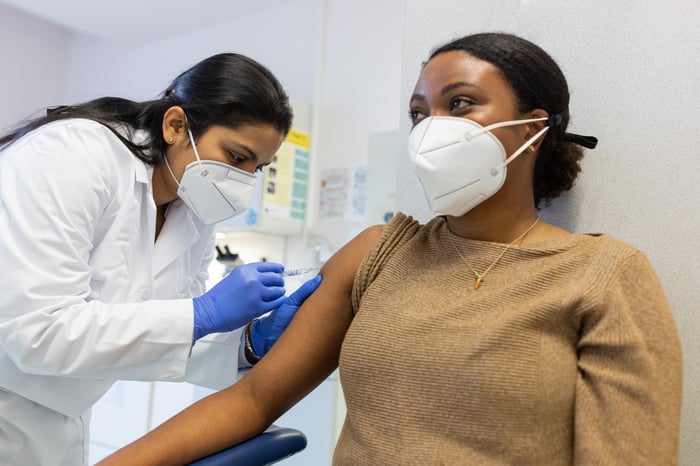Although things have improved, we are still in the midst of a pandemic. One important reason we are getting closer to some sort of pre-pandemic normal is that vaccines for the disease are now widely available in many countries. Still, we can never have too many safe and effective vaccines, and several companies are looking to launch new ones on the market.
Ocugen (NASDAQ: OCGN), a clinical-stage biotech that focuses on eye-related diseases, is one such company aiming to make a dent in the coronavirus vaccine market in North America. However, the company has faced multiple headwinds, and there are more obstacles investors have to consider when it comes to this biotech. Let's look into two such issues and discuss whether Ocugen is worth investing in.

Image source: Getty Images.
1. Regulatory troubles
Ocugen's candidate, Covaxin, was developed by India-based Bharat Biotech. Per an agreement signed between the two entities back in 2021, Ocugen will profit from this vaccine if it earns approval or emergency use authorization (EUA) in North America. Even then, it will keep only 45% of the profit. However, Ocugen's plan for Covaxin to quickly gain the nod ran into several regulatory headwinds.
- In June 2021, the U.S. Food and Drug Administration (FDA) recommended that Ocugen pursue full approval for Covaxin instead of trying to obtain EUA; the latter would have been a much quicker process.
- In November 2021, the company applied for EUA for Covaxin for children between the ages of 2 and 18, but the FDA declined to approve it.
- On April 12, the FDA placed the company's phase 2/3 clinical trial for Covaxin on clinical hold. That was a result of Ocugen voluntarily pausing the dosing of participants in this study after the World Health Organization's (WHO) inspection of Bharat Biotech's manufacturing process for Covaxin raised some concerns.
- Ocugen submitted an EUA for Covaxin in Canada in July 2021, but the company's application received a notice of deficiency from authorities in the country. Ocugen has responded to the concerns raised by regulators and is still awaiting a final decision.
While Covaxin could still hit the market in Canada relatively soon, the vaccine's chances in the U.S. look dim at best. It will take some time to complete the clinical study the company is currently running in the country, not to mention the regulatory process that will also take months.
Perhaps the pandemic won't be over by then, or maybe it will. Even if the pandemic is still ongoing, other vaccines have come to dominate the market, and others could enter it in the meantime. Covaxin will be unlikely to make a dent in this competitive environment.
2. An early-stage pipeline
Ocugen does not have any products on the market at the moment. The company's most advanced candidate is Covaxin, and while it has other programs in the works, they are still in early-stage development. Some of the company's other candidates include OCU400, a potential gene therapy for retinitis pigmentosa and other inherited retinal diseases.
OCU400 is currently undergoing a phase 1/2 clinical study. Ocugen's other products haven't even started human clinical trials yet. The company probably planned to use the profits it thought it would make from Covaxin to advance its pipeline. However, things haven't worked out that way. Could funding become an issue for the company?
Ocugen ended 2021 with a cash and equivalents balance of $95.1 million. Last year, the company's net cash used in operating activities came in at $47.9 million. However, Ocugen announced that it had dosed its first patient in its phase 1/2 clinical trial for OCU400 on April 1.
With this ongoing study and Covaxin's phase 2/3 trial (if the clinical hold is lifted), the company's expenses will almost certainly rise this year. Ocugen may have to resort to dilutive methods of financing, as clinical-stage biotechs often do, and that's something for investors to keep in mind.
Not worth the trouble
Ocugen's prospects in the coronavirus market in North America aren't great. In addition, the company's other pipeline candidates still have a long way to go before even starting late-stage studies. That's why the biotech's shares have dropped substantially in the past year. And even at current levels, Ocugen looks far too risky for most investors. There are plenty of other (and better) biotech stocks to consider on the market.
10 stocks we like better than Ocugen, Inc.
When our award-winning analyst team has a stock tip, it can pay to listen. After all, the newsletter they have run for over a decade, Motley Fool Stock Advisor, has tripled the market.*
They just revealed what they believe are the ten best stocks for investors to buy right now... and Ocugen, Inc. wasn't one of them! That's right -- they think these 10 stocks are even better buys.
*Stock Advisor returns as of April 7, 2022
Prosper Junior Bakiny has no position in any of the stocks mentioned. The Motley Fool has no position in any of the stocks mentioned. The Motley Fool has a disclosure policy.
The views and opinions expressed herein are the views and opinions of the author and do not necessarily reflect those of Nasdaq, Inc.


